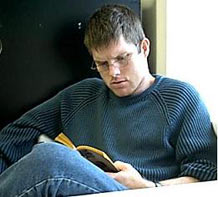 Monday, March 28, 2005
Monday, March 28, 2005
Everyone should take a moment and read the long interview with James Levine, John Harbison and Charles Wuorinen from yesterday's NYTimes. It is wonderful.
Here is a comment by Charles Wuorinen that I enjoy.
As I've said a million times, there has been an attempt, largely successful, to confuse what you might call art and what you might call entertainment. I think there's a very simple distinction, and it doesn't diminish entertainment in any way because we all want it and we all enjoy it. Entertainment is that which you receive without effort. Art is something where you must make some kind of effort and you get more than you had before.
I recently had a discussion with a friend about this same issue, so I was very happy to see this quote. It is much more succinct than I was in that prior discussion.
posted by Everette Minchew
12:25 PM
|
|
 Composer Everette Minchew (born 1977) is consistently active in the creation, performance, and promotion of contemporary music. Moderately prolific, his catalogue includes small chamber pieces for violin, piano, various wind instruments, harpsichord and electronic music. Current commissions include a string trio and an opera based on an 11th-century crusades tale.
His earliest musical training came at the age of eleven when he began playing alto saxophone; it wasn’t long until he began his first attempts in composition.
Composer Everette Minchew (born 1977) is consistently active in the creation, performance, and promotion of contemporary music. Moderately prolific, his catalogue includes small chamber pieces for violin, piano, various wind instruments, harpsichord and electronic music. Current commissions include a string trio and an opera based on an 11th-century crusades tale.
His earliest musical training came at the age of eleven when he began playing alto saxophone; it wasn’t long until he began his first attempts in composition.
He received a Bachelor’s Degree in Music History from the University of Southern Mississippi, where he studied saxophone under world-renowned soloist, Lawrence Gwozdz.
Fearing that traditional university training would hinder his development as a progressive composer, he abandoned the idea of formal lessons in favor of an intense private study of modern masterworks.
Minchew's works are characterized by their intense timbral explorations and brutal dissonance. That is not to say, however, that the compositions are devoid of beauty. In the first of the Two Brief Pieces, for example, the harpsichord chimes stringent yet haunting chords evoking a sense of loss.
Other pieces, like the Figment No. 2 "Juggler's Fancy" play upon the kaleidoscopic interaction between timbres and tones. The rapid alternation of pizzicato, arco bowing, and extreme glissandi remind the listener of Xenakis coupled with a Berio Sequenza. Minchew's Invention "Two-Part Contraption" for piano owes much to Ligeti's etudes and boogie-woogie jazz.
His music has been performed around the United States, and he was the featured composer at the 2005 Intégrales New Music Festival in Hattiesburg, Mississippi.
He currently resides in Hattiesburg, Mississippi with his wife, Cheryl.
CONTACT INFORMATION
| |



